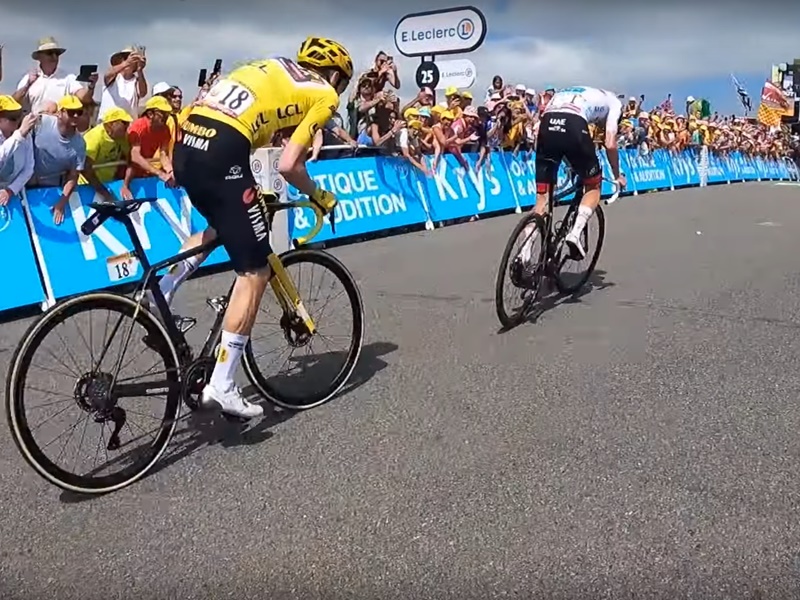
- Preview
- Stages 1-9
- Stages 10-15
- Stages 16-21
This 2023 Tour de France preview is so breath-takingly comprehensive, it actually features a smattering of references to riders who aren’t Tadej Pogacar or Jonas Vingegaard. There’s a quick look at some of the big stages coming up in the first week as well.
Last year’s Tour de France was won by Jonas Vingegaard ahead of Tadej Pogacar. The previous edition was won by Pogacar ahead of Vingegaard. There’s only one way to decide this… with another Tour de France!
The Slovenian’s 2020 victory and uncommon strength across a broader range of races arguably makes him the more significant figure, so we’ll start with him first, but it’s worth pointing out that three weeks is a long time to sustain a story without a plot twist. Grand Tour head-to-heads can sometimes suffer a decapitation or two…
Tadej Pogacar
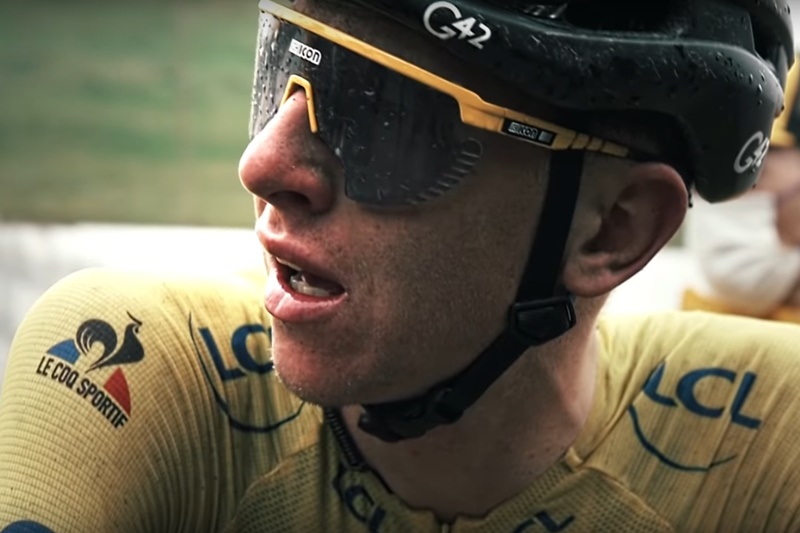
Pogacar may have finished as runner-up last year, but he retains the greater aura. This is borne of two things. Firstly, there’s a sense that he’d never particularly developed any real notion that he had physical limitations until Jumbo-Visma’s two team leaders ganged-up on him in 2022 and maybe this means he’ll race a little smarter. Secondly… jeez the lad’s winning some races.
Until Vingegaard and Primoz Roglic wore him down with an endless barrage of attacks on Stage 11, Pogacar had never really been derailed by fatigue. Up until that moment, his apparent impervious to tiredness led him to piss away energy here there and everywhere without experiencing any real consequences. He would routinely launch hell-for-leather sprints for the line in the hope of opening a gap and gaining a single second on his rivals. Now partially disabused of notions of superhumanity, it feels like he may race slightly more conservatively, preserving more energy for when he thinks he can do serious damage.
That said, his efforts this spring don’t suggest he’s going to turn into 2012-era Bradley Wiggins any time soon, grinding his rivals down with long, steady efforts. A whole string of major one-day victories speak of a rider unafraid to put in a hard effort or 20. His victory on the cobbled climbs of the Tour of Flanders stands out in particular. The demands of that race are sufficiently distinct from the Tour that only two other riders have ever won both: Louison Bobet and – entirely predictably – Eddy Merckx.
Jonas Vingegaard
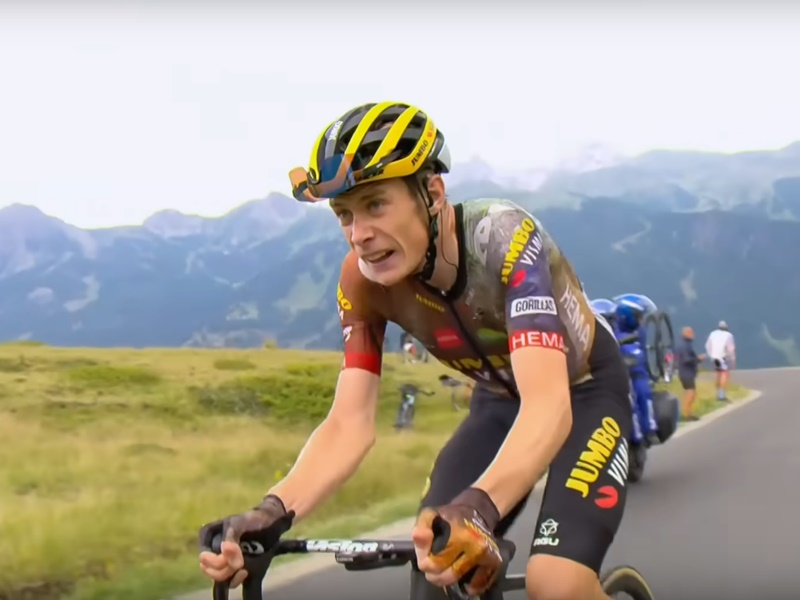
Considering they’re so closely associated, Pogacar and Vingegaard are oddly different riders. While the former competes in all sorts of races throughout the season, Vingegaard has a much narrower set of strengths and seemingly much greater variation in form.
Jonas Vingegaard’s greatest strength is that he can sometimes out-climb Tadej Pogacar on a mountain pass in July. And if you’re going to be great at one thing, it may as well be that. Pogacar can pretty much do it all, but the Dane’s whole season is built around peaking for long mountain passes in July and last year that won him the Tour de France.
In many ways things look good for him again this year. Riding the Criterium du Dauphiné last month, he was so much better than his rivals that eventually they just ignored him. He would attack and they would just let him go. Ben O’Connor – fourth overall at the 2021 Tour de France – explicitly said there was no point following him. “You’re not going to win.”
There is however a conspicuous absentee from Vingegaard’s team this year: Primoz Roglic.
Along with 2022 Vuelta a Espana winner Remco Evenepoel (who is also skipping the Tour), Roglic is about the only other rider with the capacity to seriously worry Pogacar. As evidence of that, he just won the Giro d’Italia. Roglic’s threat was very useful in 2022 when Pogacar felt obliged to chase both men down. While Jumbo-Visma’s team remains ludicrously strong, it’ll be a bit more mano e mano this time around.
The three Ineos Grenadiers
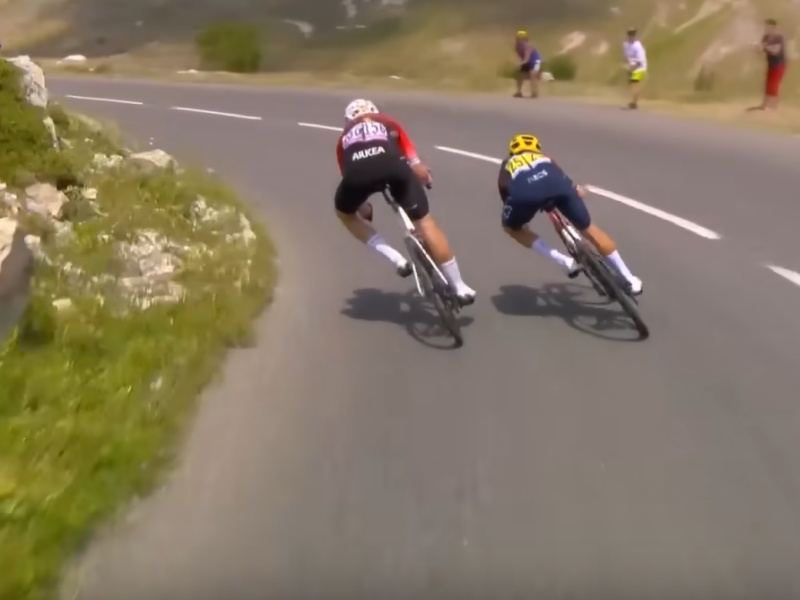
Ineos had a good tilt at this year’s Giro via Geraint Thomas, but the Tour’s another matter. Egan Bernal’s 2019 victory is their only win since the Team Sky days and it’s hard to see them competing this time around.
Bernal is technically back after missing most of last season after crashing into a stationary bus at 62km/h and suffering exactly the kinds of injuries you’d expect from such an incident. In his own words: “Almost 20 broken bones. Eleven ribs, femur, kneecap, T5-T6, odontoid fracture, metacarpal, a thumb, lost a tooth, both lungs perforated.” His recent form has been encouraging, but only in the sense that he’s returning from that.
I think Bernal’s countryman, Daniel Martinez, is being put forward as Ineos team leader, but his best result at a Grand Tour is fifth in the 2021 Giro. Olympic cross-country mountain bike gold medallist Tom Pidcock is therefore probably the more interesting rider. He won a stage last year and will probably try and go for the overall one day. This year may be a voyage of discovery for the young Yorkshireman.
Jai Hindley
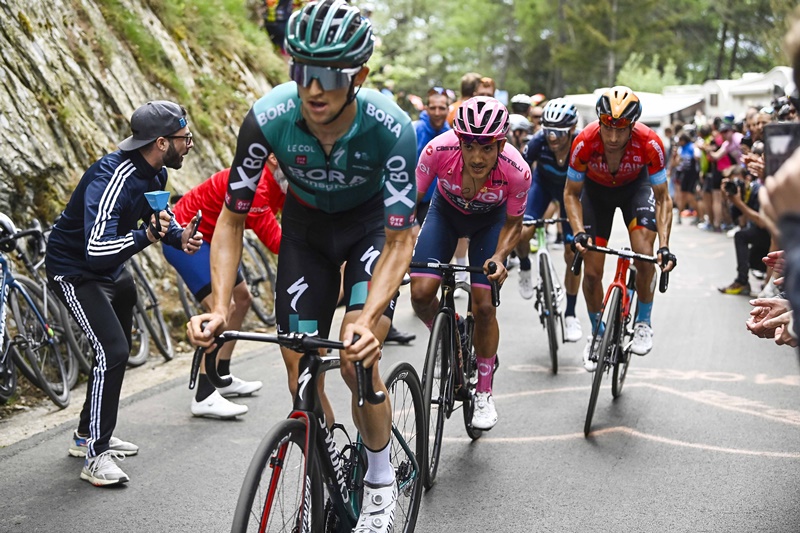
There will never be a time when I don’t think of Jai Hindley as that guy who spent 45 minutes trying to put a jacket on while riding up a mountain pass. He has however also won a Grand Tour – and not even that long ago. I’d probably have him down as ‘best of the rest’ behind the big two, which is a pretty handy place to lurk in a race as mad and unpredictable as the Tour de France.
Mattias Skjelmose
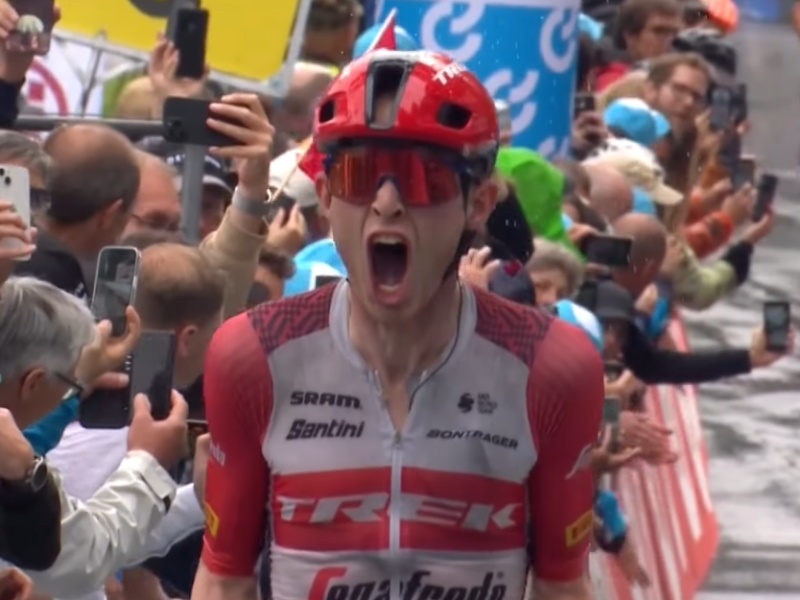
With most of the overall contenders, we already have a pretty good idea what their limits are and it’s therefore hard to see them winning. Young Danish rider Mattias Skjelmose therefore owes his inclusion here to that old forecasting factor known as ‘the benefit of the doubt’. Skjelmose was a narrow second to Pogacar up the steep slopes of the Mur de Huy at the end of La Fleche Wallonne in the spring and has since won the Tour de Suisse. We don’t know much more about him. Let’s see how he goes.
Everyone else
Like I say, it’s hard to envisage anyone else being a protagonist without at least a couple of abandonments.
Enric Mas will probably be in the top five and Ben O’Connor will be shooting for something similar – as will David Gaudu, the most obvious French hope (although Romain Bardet isn’t as old and decrepit as people seem to think he is). Richard Carapaz has pedigree but no obvious recent form.
Adam Yates‘ main job on his new team will be to help Pogacar out, but he may also find himself quite high up the general classification as a product of that. His twin brother Simon Yates also rides – he has actually won a three-week race, lest we forget, but he’s also had to abandon his last three.
Mark Cavendish rides too. One stage win would put him clear of Eddy Merckx as the most successful stage-winner in Tour history, but frankly he’s the greatest sprinter the sport’s seen even if he crashes out in the neutral zone on day one.
The first week
I don’t normally preview the route in these pieces, but it’s worth highlighting a few early stages this time around because the Tour de France isn’t pissing about this year.
The race starts in the Basque Country, which means hills from the off. Stage 1 (Saturday) isn’t for the sprinters and nor is Stage 2 (Sunday).
Stages 3 and 4 provide a bit of a reprieve and then by Wednesday we’re in the mountains already. Stage 5 has the first hors catégorie (“beyond categorisation”) climb and then Stage 6 (Thursday) serves up the Col d’Aspin (12km at 6.5%), immediately followed by the Col du Tourmalet (17.1km at 7.3%), ahead of a summit finish to Cauterets (16km at 5.4%).
This means we’ll have a pretty good idea who’s in genuine contention for the yellow jersey before we even get to the first weekend.
The week finishes with Stage 9 on Sunday and another (harder) summit finish on the Puy de Dôme volcano (13.3km at 7.7%).
If you enjoy my Tour de France coverage, you can buy me a coffee/Belgian beer here – and I do promise that I’ll invest in one of those two things.
I’m aiming to do weekly recaps within a day or two of each rest day. You can sign up to receive these by email, if you haven’t already done so.
Leave a Reply